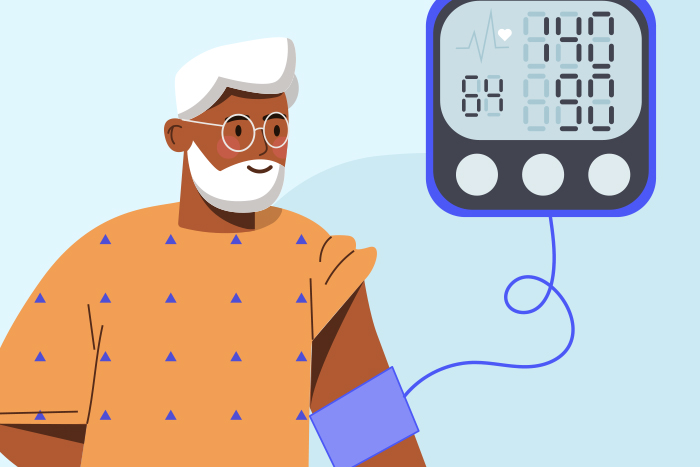Understanding High Blood Pressure
Many older adults have high blood pressure, also known as hypertension, but may not fully understand what it means or why it’s dangerous. High blood pressure is often called the "silent killer" because it usually has no symptoms but can lead to serious health problems like heart disease and stroke. The good news is that managing blood pressure is possible with simple lifestyle changes and, if necessary, medication.
Let’s break down what high blood pressure is, what causes it, and how you can take steps to keep it under control.
What do blood pressure numbers mean?
When you have your blood pressure checked, you get two numbers:
Systolic Pressure: This is the top number and measures the pressure in your arteries when your heart beats.
Diastolic Pressure: This is the bottom number and measures the pressure in your arteries when your heart is resting between beats.
A normal blood pressure reading is typically around 120/80 mmHg. Here’s what different blood pressure numbers mean:
Normal: Less than 120/80 mmHg
Elevated: 120-129/<80 mmHg
High Blood Pressure (Stage 1): 130-139/80-89 mmHg
High Blood Pressure (Stage 2): 140+/90+ mmHg
Hypertensive Crisis: Higher than 180/120 mmHg (Seek medical help immediately)
Consistently high numbers mean your heart is working too hard, which can damage blood vessels over time.
Causes and Risk Factors
Several factors can contribute to high blood pressure, including:
Aging: Blood vessels become less flexible with age.
Family History: If close family members have hypertension, you may be more likely to develop it.
Poor Diet: Eating too much salt, saturated fats, and processed foods can raise blood pressure.
Lack of Exercise: Regular physical activity helps keep blood pressure in check.
Obesity: Carrying extra weight puts more strain on your heart.
Smoking and Alcohol Use: Both can raise blood pressure and damage blood vessels.
Chronic Stress: Long-term stress can contribute to hypertension.
Medical Conditions: Diabetes, kidney disease, and sleep apnea can all increase the risk of high blood pressure.
How to Check Your Blood Pressure
Keeping track of your blood pressure is an important part of staying healthy. Here’s how you can monitor it:
At the Doctor’s Office: Your doctor will check your blood pressure at regular visits.
At Home: Home blood pressure monitors are easy to use and can help track your numbers over time.
At a Pharmacy: Many pharmacies have self-service blood pressure stations.
It’s best to check your blood pressure at the same time each day and record the results to share with your doctor.
Ways to Keep Blood Pressure Under Control
Managing high blood pressure doesn’t have to be complicated. Here are some simple steps you can take:
Eat a Heart-Healthy Diet: Focus on fruits, vegetables, whole grains, and lean proteins while cutting back on salt and processed foods.
Stay Active: Aim for at least 30 minutes of moderate exercise most days of the week. Moderate exercise includes activities like brisk walking, swimming, biking, gardening, or mowing the lawn.
Maintain a Healthy Weight: Losing even a small amount of weight can help lower blood pressure.
Limit Alcohol and Avoid Smoking: Both can increase blood pressure and damage your heart.
Manage Stress: Try deep breathing, meditation, or hobbies that help you relax.
Take Medications as Prescribed: If your doctor prescribes blood pressure medication, take it as directed.
Get Enough Sleep: Poor sleep can contribute to high blood pressure, so aim for 7-9 hours per night.
Medications for High Blood Pressure
If lifestyle changes aren’t enough to lower your blood pressure, your doctor may recommend medication. There are several types of medications that work in different ways:
Diuretics: Help remove excess salt and water from your body, reducing blood pressure.
Beta-Blockers: Reduce heart rate and the force of heartbeats to lower blood pressure.
ACE Inhibitors: Help relax blood vessels by preventing the production of a hormone that narrows them.
Calcium Channel Blockers: Relax blood vessels and slow the heart rate.
ARBs (Angiotensin II Receptor Blockers): Work similarly to ACE inhibitors by keeping blood vessels open.
Your doctor will determine the best medication for you based on your overall health, any other conditions you have, and how your body responds to treatment. It’s important to take medications exactly as prescribed and discuss any side effects with your healthcare provider.
What is secondary hypertension?
Most high blood pressure cases are considered "primary hypertension," meaning there’s no single cause. However, some people develop secondary hypertension, which is caused by an underlying medical condition. Some common causes include:
Kidney disease
Thyroid disorders
Sleep apnea
Certain medications (such as birth control pills or decongestants)
If your doctor suspects secondary hypertension, they may order tests to find and treat the root cause.
Take Charge of Your Health
High blood pressure may be common, but it’s not something to ignore. By understanding your numbers, knowing your risk factors, and making simple lifestyle changes, you can take control of your health and lower your risk of serious complications.
If you haven’t had your blood pressure checked recently, consider scheduling a check-up with your doctor. The sooner you take action, the better you’ll feel and the healthier you’ll be.
Sources:
National Heart, Lung, and Blood Institute: What Is High Blood Pressure?
Centers for Disease Control and Prevention: High Blood Pressure
American Heart Association: What are the Signs and Symptoms of High Blood Pressure?
Mayo Clinic: Secondary Hypertension

